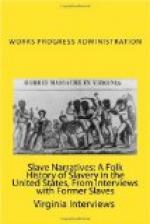“They’d bring a slave out on the flatform and open his mouth, pound his chest, make him harden his muscles so the buyer could see what he was gittin’. Young men was called ‘bucks’ and young women ‘wenches’. The person that offered the best price was de buyer. And dey shore did git rid uf some pretty gals. Dey always looked so shame and pitiful up on dat stand wid all dem men standin’ dere lookin’ at em wid what dey had on dey minds shinin’ in they eyes One little gal walked up and left her mammy mourning so pitiful cause she had to be sold. Seems like dey all belong in a family where nobody ever was sold. My she was a pretty gal.”
“And dats why your mamma’s named Julia stead of Mary Jane or Hannah or somethin’ else—She cost me $950.00 and den my own freedom. But she was worth it—every bit of it!”
“After that I put off my trip back home and made her home my home for three years. Den with our two young children we left Floridy and went to the West Indies to live. We traveled bout a bit gettin as far as England. We got letters from your ma’s folks and dey jes had to see her or else somebody would’er died, so we sailed back into de war.”
“Freedom was declared soon after we got back to dis country and de whole country was turned upside down. De po niggers went mad. Some refused to work and dey didn’t stay in one place long ’nough to do a thing. De crops suffered and soon we had starvation times for ’bout two years. After dat everybody lernt to think of a rainy day and things got better.”
Edward recalls of hearing his father tell of eating wild hog salad and cabbage palms. It was a common occurence to see whole families subsisting on any wild plant not known to be poisonous if it contained the least food value. The freedmen helped those who were newly liberated to gain a footing. Prior to Emancipation they had not been allowed to associate with slaves for fear they might engender in them the desire to be free. The freedmen bore the brunt of the white man’s suspicion whenever there was a slave uprising. They were always accusing them of being instigators. Edward often heard his mother tell of the “patter-rollers”, a group of white men who caught and administered severe whippings to these unfortunate slaves. They also corraled slaves back to their masters if they were caught out after nine o’clock at night without a pass from their masters.
George Lycurgas was born at Liverpool, England and became a seaman at an early age. Edward thinks he might have had a fair education if he had had the chance. The mother, Julia Gray, Lycurgas, was the daughter of Barbara and David Gray, slaves of the Flemings of Clay County, Florida.
These slaves were inherited from generation to generation and no one ever thought to sell one except for punishment or in dire necessity. They were treated kindly and like most slaves of the wealthy, had no knowledge of the real cruelties of slavery, but upon the death of their owner it became necessary to parcel the slaves out to different heirs, some of whom did not believe in holding these unfortunates. These would-be abolitionists were not averse to placing at auction their share of the slaves, however.




